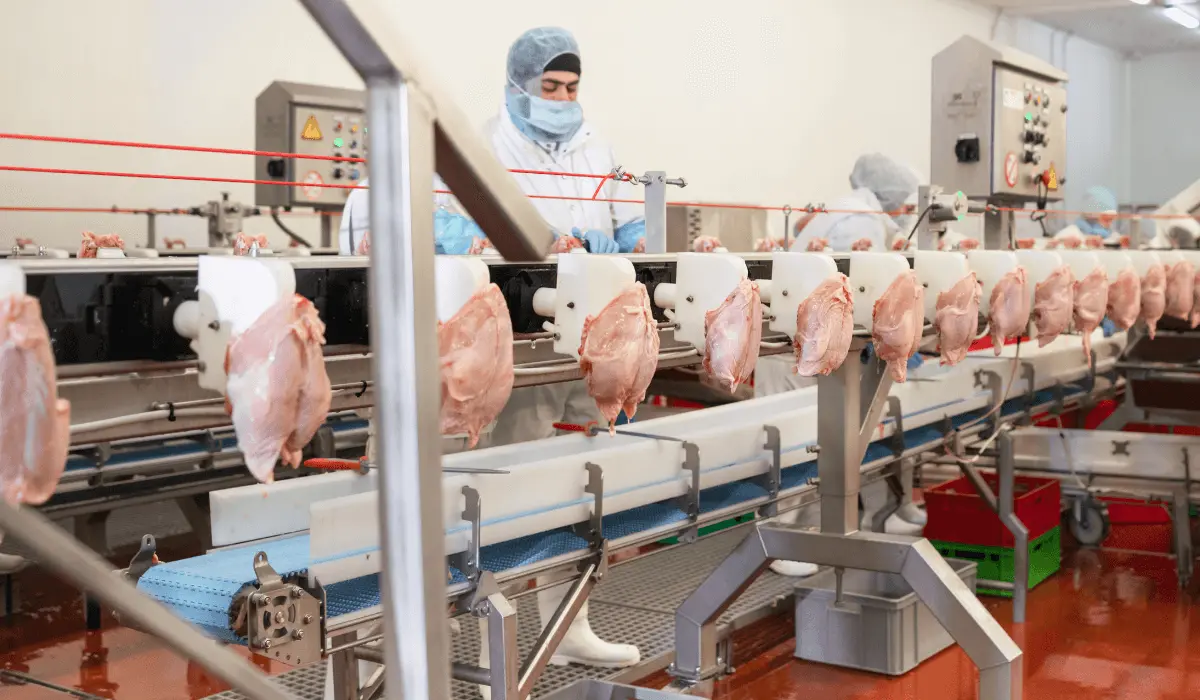In Malaysian meat processing plants, ensuring the health and safety of workers is of utmost importance. Occupational health risks can arise from handling machinery, exposure to harmful substances, ergonomic issues, and environmental factors. This is where Health, Safety, and Environment (HSE) consultants play a crucial role. Their expertise and knowledge contribute to creating a safe and healthy working environment for the employees.
HSE consultants work closely with meat processing plants to identify potential hazards, conduct risk assessments, and develop strategies to mitigate occupational health risks. They ensure compliance with occupational health standards and regulations, such as ISO 45001, and help companies adopt best practices.
Maintaining a safe workplace not only protects the well-being of employees but also enhances overall productivity. By prioritizing workplace safety and seeking guidance from HSE consultants, meat processing plants can create a secure and productive work environment.
Occupational Health Risks in Malaysian Meat Processing Plants
Meat processing plants in Malaysia present specific occupational health risks that need to be addressed to ensure the well-being of the workers. Understanding these risks is crucial in implementing effective measures to protect employees and create a safe working environment. In this section, we will discuss the occupational health risks commonly found in Malaysian meat processing plants, including potential hazards, statistics, and real-life examples.
Handling Machinery
Working with machinery poses various risks for employees in meat processing plants. Improper use of equipment or lack of training can lead to serious injuries, such as cuts, crushed limbs, or amputations. The fast-paced nature of the industry increases the chances of accidents, making it essential to implement proper training programs and safety protocols. For example, providing employees with personal protective equipment (PPE) like gloves and goggles can help minimize the risk of injuries.
Exposure to Harmful Substances
Meat processing involves the use of chemicals and substances that can be harmful if not handled correctly. Cleaning agents, sanitizers, and disinfectants may contain hazardous ingredients that can cause skin irritation, respiratory issues, or long-term health problems. Proper handling and storage of these substances, as well as the use of appropriate PPE, are crucial to minimizing exposure and protecting workers’ health.
Ergonomic Issues
Repetitive tasks, prolonged standing, and improper ergonomics can lead to musculoskeletal disorders among meat processing plant workers. These conditions, such as back pain, joint problems, and strains, can impact productivity and employee well-being. Implementing ergonomic workstations, providing regular breaks, and introducing stretching exercises can help reduce the risk of such injuries and promote a healthier work environment.
Environmental Factors
Meat processing plants are often characterized by challenging environmental conditions that can impact workers’ health. Factors such as extreme temperatures, high humidity, noise levels, and poor ventilation can contribute to discomfort and health issues. Adequate temperature control systems, noise reduction measures, and ventilation improvements are essential to create a safer and more comfortable working environment for employees.
Importance of HSE Consultants
HSE consultant plays a vital role in mitigating occupational health risks in Malaysian meat processing plants. Their expertise and knowledge contribute to creating a safe and healthy working environment, ensuring the well-being of employees. Here are some key reasons why HSE consultants are significant in this regard:
Expertise in Risk Assessment and Management
HSE consultants possess a wealth of expertise in conducting thorough risk assessments. They evaluate the specific occupational health risks present in meat processing plants, including potential hazards such as machinery handling, exposure to harmful substances, ergonomic issues, and environmental factors. By identifying and analyzing these risks, HSE consultants can help companies implement targeted strategies to reduce incidents and safeguard workers’ health.
Compliance with Safety Standards
Complying with occupational health standards and regulations is crucial in the meat processing industry in Malaysia. HSE consultants guide companies on the necessary measures to achieve compliance, ensuring that the workplace adheres to internationally recognized standards such as ISO 45001. By assisting companies on their compliance journey, HSE consultants help create a culture of safety and reduce the risk of legal implications.
Implementation of Best Practices
HSE consultants bring extensive knowledge of industry best practices to meat processing plants. They advise on the most effective occupational health management strategies, covering areas such as employee training, personal protective equipment, ergonomics, hazard communication, and health surveillance. By implementing these best practices, companies can proactively prevent accidents and occupational illnesses, promoting a productive work environment.
Continuous Improvement and Adaptation
In the ever-evolving work environment, HSE consultants stay abreast of the latest trends and innovations in occupational health management. Their role includes keeping companies informed about potential opportunities and strategic advantages that arise from adopting new technologies and data analytics. HSE consultants assist organizations of all sizes in staying ahead of regulatory changes and incorporating powerful tools to enhance workplace safety.
Compliance with Occupational Health Standards
Compliance with occupational health standards and regulations is of utmost importance in the meat processing industry in Malaysia. Ensuring the safety and well-being of employees is not only a legal requirement but also a moral obligation for companies operating in this sector. HSE consultants play a crucial role in guiding companies towards achieving and maintaining compliance with these standards.
One key standard that HSE consultants often emphasize is the ISO 45001 certification. This internationally recognized standard provides a framework for companies to develop and implement an effective occupational health and safety management system. HSE consultants help companies navigate the certification process, ensuring that all necessary requirements are met.
Complying with occupational health standards goes beyond just meeting legal obligations. It creates a culture of safety within the workplace and reduces the risk of accidents and occupational illnesses. By adhering to these standards, companies demonstrate their commitment to providing a secure workplace for their employees.
HSE consultants provide guidance on various aspects of compliance, including risk management, hazard identification, and control measures. They assist companies in conducting comprehensive risk assessments and developing strategies to mitigate potential occupational health risks. Through their wealth of expertise and knowledge, HSE consultants help companies establish and maintain a productive work environment while prioritizing the safety and well-being of their employees.
In the ever-evolving work environment, compliance with occupational health standards is not only a legal requirement but also provides strategic advantages to companies. Being proactive in complying with these standards enables organizations of all sizes to stay ahead in an industry that values safety and risk management.
By working with HSE consultants, companies can navigate the complex regulatory landscape, identify potential opportunities for improvement, and ensure their compliance journey aligns with the specific requirements of the meat processing industry in Malaysia.
Strategies for Occupational Health Management
To effectively manage occupational health risks in meat processing plants, HSE (Health, Safety, and Environment) consultants recommend a range of strategies and best practices. By implementing these measures, companies can create a safe and healthy working environment for their employees. Here are some actionable strategies often advised by HSE consultants:
1. Employee Training
Training programs play a crucial role in promoting occupational health and safety. It is essential to educate employees about potential hazards, safe work practices, and the proper use of equipment. HSE consultants often recommend comprehensive training sessions that cover topics such as:
– Handling machinery and equipment safely
– Identifying and responding to work-related hazards
– Proper use of personal protective equipment (PPE)
– Emergency response procedures
– Ergonomics and correct body mechanics
– Health and hygiene practices
By investing in regular training programs, companies can enhance employee knowledge and awareness, reducing the risks of accidents and injuries.
2. Personal Protective Equipment (PPE)
Providing employees with appropriate personal protective equipment is crucial for preventing occupational health risks. HSE consultants emphasize the importance of assessing the specific hazards within meat processing plants and recommending the right types of PPE accordingly. This may include:
– Safety goggles or face shields to protect against splashes or airborne contaminants
– Gloves to prevent cuts, abrasions, or chemical exposure
– Protective clothing, such as aprons or coveralls, to minimize contact with hazardous substances
– Respiratory protection devices, such as masks or respirators, in areas with airborne pollutants
Regular inspections, maintenance, and proper training on correct usage and maintenance of PPE are also vital aspects to consider.
3. Ergonomics
Creating ergonomic workstations and processes is crucial for reducing the risk of musculoskeletal disorders and other physical ailments among employees. HSE consultants often recommend conducting ergonomic assessments to identify areas of improvement and implement appropriate measures, such as:
– Adjustable workstations and chairs to promote proper posture
– Ergonomically designed tools and equipment to minimize strain
– Regular breaks and stretching exercises to prevent fatigue and repetitive strain injuries
By prioritizing ergonomic considerations, companies can significantly enhance employee comfort, productivity, and overall well-being.
4. Hazard Communication
Clear and effective communication of workplace hazards is essential for maintaining a safe working environment. HSE consultants advise implementing effective hazard communication programs that encompass:
– Clear signage and labeling of hazardous areas or substances
– Safety data sheets (SDS) outlining the properties and handling procedures for hazardous chemicals
– Regular briefings and meetings to discuss potential hazards, incidents, and preventive measures
– Encouraging employees to report any safety concerns or near-miss incidents
By establishing open lines of communication, companies can ensure that employees are well-informed about potential risks and can take appropriate precautions.
5. Health Surveillance
Regular health surveillance programs are recommended by HSE consultants to track and monitor the well-being of employees in meat processing plants. This may involve:
– Pre-employment health assessments to ensure suitability for specific roles
– Periodic medical check-ups to identify any work-related health issues
– Health monitoring for specific hazards, such as noise exposure or chemical exposure
– Collaboration with occupational health professionals for early detection and management of occupational illnesses
By implementing health surveillance programs, companies can proactively identify and address any emerging health issues among their employees.
Conclusion
Prioritizing occupational health in Malaysian meat processing plants is crucial for safeguarding the well-being of workers and enhancing overall productivity. By seeking guidance from HSE consultants, companies can ensure comprehensive risk management and create a safe working environment.
Throughout this article, we have explored the pivotal role of HSE consultants in addressing and managing occupational health risks specific to the meat processing industry in Malaysia. We have discussed the importance of workplace safety, compliance with occupational health standards, and the adoption of best practices.
It is evident that HSE consultants bring a wealth of expertise and knowledge to assist companies in mitigating occupational health risks. Their role involves regular risk assessments, ensuring compliance with safety standards, and implementing effective strategies for occupational health management.
To achieve a secure workplace, companies must prioritize the safety of their employees and proactively address potential occupational health hazards. By partnering with HSE consultants, organizations of all sizes can navigate the regulatory landscape, stay up-to-date with the latest trends, and implement internationally recognized standards such as ISO 45001.



